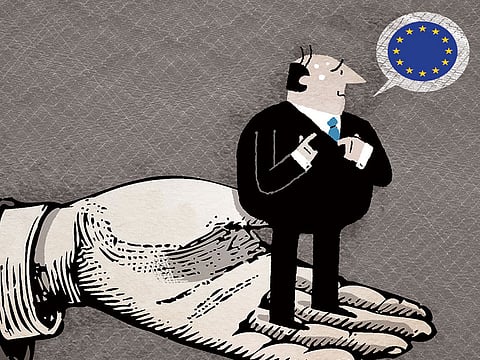Member states must back their EU leaders
The financial crisis has undermined the European Union’s clout and shown that member states are the ultimate paymasters and therefore ultimate decision-makers

In August seven years ago I was with Carl Bildt, then the Swedish foreign minister, and Anna-Maria Corazza Bildt, his wife and an Member of European Parliament, celebrating their wedding anniversary, when suddenly I felt as if I were in a Hollywood film about an international crisis. Just as Corazza Bildt was making her toast, everybody’s mobile phones began to ring. The Russians had just invaded Georgia, and spoilt our party.
Bildt rushed to the Caucasus; I rang Bernard Kouchner, the French foreign minister. France held the presidency of the EU, and he quickly convened an EU foreign affairs council. Within a couple of days, Nicolas Sarkozy, French president, was in Moscow, negotiating a truce on behalf of the EU.
He had some success: by harnessing the full authority of the EU and its member states, Sarkozy was able to negotiate a truce that ended the fighting and saved a democratic government in Georgia, whose survival, at that moment, was far from certain.
Since then, however, the situation has deteriorated. South Ossetia and Abkhazia, the two territories claiming “independence”, remain frozen conflicts. The people who live there have no prospects, the border remains contested and Georgia and Russia are in a state of permanent struggle. Worse, if there is a European foreign policy towards the Caucasus, it has not yet succeeded.
“Ambiguous” was not the word we were meant to be using about European foreign policy, six years after the Lisbon treaty entered into force. At the time the pact was negotiated, we correctly concluded that, relative to the other powers in the world, all European countries are small and can only exert real influence by acting together.
Instead of a rotating presidency, the treaty established the office of EU council president, its highest interlocutor with the rest of the world — now held by Donald Tusk — as well as an office of high representative for foreign policy, intended to aggregate the interests of the member states, to direct EU diplomacy and to conduct our foreign policy on those issues where we reach consensus. Jointly, they are supposed to represent the interests of the EU as a whole.
But more recently, some EU member states have reverted to the status quo ante, and taken centre stage in the crises in our southern and eastern neighbourhoods. Whether on Syria, the Israel-Palestine conflict, Libya or refugees, member states are more visible than the EU, despite the efforts of Federica Mogherini, the foreign policy chief.
On Ukraine, the EU is not even at the negotiating table. Instead, Germany and France — neither of whom shares a border with Ukraine — have taken it upon themselves to manage Russian aggression, with only partial success.
The reasons are clear. The financial crisis has undermined the EU’s clout and shown that member states are the ultimate paymasters and therefore ultimate decision makers. However, what was unavoidable in the resolution of the Eurozone crisis makes no sense in foreign policy. Russia is using the divisions inside Europe to create disunity, making a special effort to engage states that have little stake, individually, in the EU’s influence spreading east.
As the Minsk ceasefire agreement stalls and fighting continues in eastern Ukraine, we are back to where we started a decade ago. The leaders of Russia, China and the US will listen to the leaders of the largest EU states, but are not at all inclined to act on what they hear. And if they want to call “Europe” it is still not clear which number they should ring.
Europe remains unable to influence events or bend history to its interests to a degree that reflects its status as the largest economy. If foreign policy is about helping to manage the free world, we need to go back to the rules created in the Lisbon treaty.
Case by case, member states should calculate whether a given issue is better resolved by them alone, or by the EU as a whole. And if they decide upon the latter, then they had better get behind European policy no matter what the domestic pressures. Germany, in particular, should be pleased by this principle. The Greek crisis has proved that if you take centre stage, you also get most of the blame. If Ukraine goes wrong, Germany will be blamed for that, too.
While the US as the world’s sole military hyperpower cannot lead from behind, Europe’s nation states should do exactly that, and lead behind their jointly chosen leaders. We should go back to basics and empower our president and our high representative to do their jobs. Only then will we be able to evaluate their accomplishments.
—Financial Times
Radek Sikorski was formerly Poland’s minister of defence and minister of foreign affairs.


